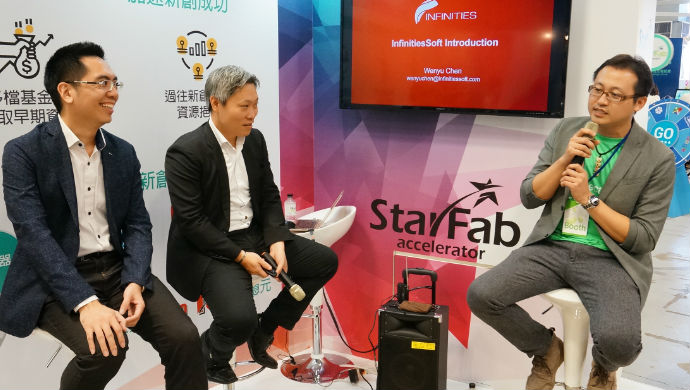Corporate Innovation Accelerators are Reshaping the Taiwan Startup Scene
Meet Taipei 2017 on how the recent help from the 'big guns' has the Taiwan startup ecosystem poised to skyrocket.
On the first day of Meet Taipei 2017, StarFab Accelerator COO Jack Hsu opened the Discovering the next Unicorn in Taiwan panel discussion with a question: is it game-changing to work with corporate partners or related ecosystem players in the early stage of startup development?
The panel, consisting of Starwing CEO Ian Chen and InfinitiesSoft CEO Wenyu Chen, unanimously agreed that partnering with corporate innovation units, either ventures or accelerators, is beneficial as it will provide easier access to 3 main resources bringing startups to the next stage: capital, business opportunities, and overseas market access.
“Firstly, if you’re about to ‘start up’ your own business in Taiwan with a solid technological product that aligns with Taiwan industry strength, such as hardware manufacturing and IoT, chances are that you will find many corporate-startup innovation programs to help you speed up the product development and connect with relevant corporate partners.” Wenyu said.
“Among these programs, StarFab (accelerator), Garage+ (incubator), and AAMA(corporate mentoring program) are the top ecosystem builders that provide catered programs to customize the product development and access to a huge pool of network to matchmake corporate business partners for commercial-basis engagements and key investors.” he stressed.
He then proceeded to share his experiences on how he was selected to join CIAT, (an incubation program supported by the Cloud Computing and IoT Association in Taiwan) and learned how to do fundraising, execute the business plans, and design the company brand positioning.
Ian was also an alumni of CIAT program and even won the 1st prize in the 3rd batch demo day. He followed up Wenyu’s remarks, stating that “apart from the supports, CIAT also furnishes the winning startup with up to 1 million NTD grants, some in-depth media coverages and conference exhibitions to assist them driving more exposures and business leads.”
“In general, accelerators and incubators focus on corporate-startup innovation are willing to empower startups to scale with sufficient resources in Taiwan nowadays.” Ian added.
The business opportunities from corporate partners
Since Taiwan has a comparatively small domestic market, Ian and Wenyu believed that the best way for B2B startups to gain more traction and drive revenue is to work with the local big corporates or multinational corporations (MNC) before expanding overseas.
“It’s very difficult for a newly-founded startup to provide some industry giants with paid-service before a celebrated recognition,” said Wenyu.
Wenyu also emphasised that “most corporate innovation accelerators are spinoffs from the corporates or the public research institutes. They’re well-connected with industry leaders and able to guide startups to find the alignments while working with corporate partners and form the strategic partnerships and alliance to propel the product development and market expansion.”
To be or not to be overseas, that is the question
To add on, Ian highlighted that “Once the startup has had some share domestic market, they need to expand overseas. Quite often, we’ve seen that startup who has just gobbled up a portion of the market decided to move out. That is very risky. You need to be at least a market leader in 1 market before entering the next and where else could be better than in your own country.”
“The most efficient and sustainable way to gain overseas market access is to make sure you’ve had a profitable product, sufficient budget and healthy company structure. The simplest criteria for this is to at least do the market expansion after series-A round investment. After that, you should be ready.” he explained.
For years, Southeast Asia has been the go-to regional market for many Taiwanese startup founders. While there are many incentives and programs from government to initiate this concept, this is not the main reason.
“We’re not just echoing with the New Southbound policy supported by government, the market size, geo-location advantage and the cultural similarity are also the critical factors that brought us there. The best way is to not fight alone but seek alliances to gather resources, information and local supports before sailing south to the battlefield.” Wenyu stressed.
“In addition to alliances, it’s also very cost-effective to team up with a regional MNC company’s branch in Taiwan before venturing out. By doing so, not only will you acquire a client in Taiwan, but you can also leverage the relationship to get some introductions and referrals in other regional markets even before your first arrival.” Ian concluded.
–
Discovering the Next Unicorn in Taiwan is a panel discussion powered by StarFab Accelerator, which was founded in 2016 to help entrepreneurs gain a footing with (large) enterprises, and enable corporate-startup collaboration to provide added-value for enterprise customers.
In line with Taiwan government innovation initiatives, StarFab has been partnering with Southern Taiwan Science Park (STSP) to co-organize the 2017 STSP Innovation Festival as part of the STSP corporate-startup accelerator program, to facilitate more startup ecosystem synergies across Taiwan and Southeast Asia.
This news was written by Norman Kuo and first published in e27. Retrieved from http://e27.co/corporate-innovation-accelerators-are-reshaping-the-taiwan-startup-scene-20171122/.
